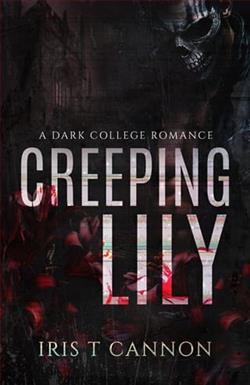Page 35 of Some Like It Scandalous
“Armand was too European—not that the accent wasn’t a clue—but Charles westernized my name. Armand Andraste came with an entourage. Charles Dagmar was just a college student.” He leaned down and kissed the back of her hand. “But Charlie was the guy lucky enough to get you to say yes to pizza and Charlie was who I wanted to be.”
“I named you Charlie.” The wonder in her voice had him tugging her hand and she slid forward, rising up onto her knees. She cupped his cheek and stared into his eyes.
“Yes, you did. Charlie was never a lie—Charlie wanted you and?—”
The door opened with a hard knock and a cough. “My apologies, Your Highness. But you’re needed on the phone immediately. It’s the FBI. Your brother’s plane landed thirty minutes ago. We expect his arrival at the tower within the next two hours.”
He grimaced and closed his eyes, but when he opened them the look in Anna’s eyes told him she already retreated. “We are not done with this conversation.”
If it were anyone but law enforcement, he would have sent the security guard away. Kissing her hand again, he rose and helped her to her feet. But still he lingered.
“Go.” She squeezed his hand. “I’m not going anywhere—except maybe downstairs to meet with Kate and my team.”
He tugged her closer again and kissed her—one hard, long, unsatisfying closed-mouth-against-her-lips kiss. “Later,” he promised and forced himself to let her go and follow the guard out.
ANNA
“Earth to Anna, come in, Anna.” Becca Sampson knocked on the desk. The recent renovations gave everyone a cubicle to work in, but the setup was a large circle so no one was actually behind a wall. Kyle stood just inside the entrance and a second guard was a few feet away. Despite her staff gaining security clearance, she would not be alone on any floor save the penthouse—and she just skipped asking them why that was.
She knew the answer.
Charlie wanted privacy with her and privacy they would have. A far cry from those days in Norway when she hadn’t managed to get five minutes with him without interruption.
“Yes? Sorry, I’m…distracted.”
“If I were dating a prince, I wouldn’t be working so you’re already three steps ahead of me.” Becca breezed across the subject and laid out a brochure. “This is the mock-up I’m working on, but we need to talk to some of the kids that were handpicked to receive the first round of scholarships. I think we should get photographs and stories from each of them and feature them prominently in the center of a series of brochures.”
Anna rubbed the back of her neck and studied the layout. They broke down the benefits of the scholarship program onone side and the requirements for application on the other. “We need this to be more prominent.” She tapped the line about ideals and goals. “Grades will factor into where they go to school, not whether they qualify for the scholarship. Move the GPA requirement to last on the list.”
“You think a C-average student is really going to apply?” Becca was young, but her cynicism finely honed.
“I think a C-average student should absolutely want to apply and not feel that his or her grades automatically disqualify them. Some kids don’t do well in high school—whether it’s their friends, their teachers, or their circumstances. You take that same group of teens and you put them in college with even one person saying ‘I believe in you’ and they thrive. That’s what every single one of these brochures has to deliver—the promise that we believe in them.” She exhaled. It bothered her when her staff, even those who believed in the opportunity, limited the vision to the definition of who “deserved” it. Derrick Milton had proven in every way to be a poster child for this effort—he didn’t think he was worthy, but she’d made a point of emailing him and calling him since they’d spoken. If someone told him enough times he deserved the chance to fly, maybe he would begin to believe it too.
“But they still have to qualify, which means it’s more than the application process—they have to be approved.” Becca chewed her lip and studied the layout. “That’s why I think we need to really sell this based on those we’ve prequalified and made our offers to. You use their names, their stories, their backgrounds and you’ll have kids going, ‘hey, that girl’s just like me’ or ‘I am doing the same things this guy is doing.’ They want someone to believe in them, but they aren’t going to buy that at face value and as Pollyanna as you can be, you know that.”
And the only reason she dragged Becca with her from the last project was her blunt approach to marketing faith.
“Okay, let’s get some phone calls made. We’ve got ten offers out there for the first round of scholarships and only two have accepted. I’m betting the others don’t believe it’s real or there’s another issue.” She turned her chair around. “Tony?”
“Already on it.” He waved at her with the phone in his hand. “I’m waiting to talk to Darnell Jamison’s foster mom.”
“Great. Good work, Becca.”
“Yep.” Becca left the mock-up on her desk and went back to work. Anna turned back to her screen and pulled up the initial funding spreadsheet. They could afford to offer twenty scholarships immediately. They earmarked ten based on questionnaires sent to one hundred high schools and cross-checked with those sent to all the social worker offices in the same areas. Pooling the data helped them identify the ten most worthy and needy candidates. Students with promising futures deemed least likely to go to college because of financial concerns—and in the top two cases because of conflicts within their foster care situations.
Twenty scholarships.
It was a small start. But they dedicated the rest of the money toward fundraising with the goal of increasing that number ten times for the next autumn. The Dagmar Foundation pledged ten million—a check she would receive on Friday during the charity event at the concert hall. The check, of course, was only symbolic. The funds would be transferred electronically. The move was to encourage others to donate as well—the first unofficial fundraiser for the Princess Alyxandretta Dagmar scholarship fund.
The numbers blurred on the screen and she blinked rapidly. A tear slid down her cheek and splashed against the keyboard. Dabbing at her eyes, she frowned. Sniffling, she pulled her purse out of the drawer and fished out a tissue. It wasn’t the first waveof tears to assault her that day and it probably wouldn’t be the last.
Forcing herself to focus, she stared at the spreadsheet again and saved it as a different file. Adding the prospective ten million and creating columns where the number increased in five-hundred-thousand increments, she began to calculate operating costs and scholarship disbursements. In a separate worksheet, she checked the expected increase in college tuition over the next five years.
The average student entering a four-year state university in their home state could expect to spend twenty thousand dollars annually—and that included food and residency. The current scholarship would allow for two years, but not the full four. Specialized schools would double that amount and a for-profit institution could triple it. The words wavered every few minutes and she dabbed her eyes again, thankful she skipped any mascara after her workout this morning.
Charlie.
She dubbed him Charlie. He told her his last name and his first, but beyond that first date he had always been Charlie. Her crazy, off-the-wall, terrifically romantic Charlie. Moving in together at the end of their sophomore year made sense. They were always together and it saved money for both of them.















